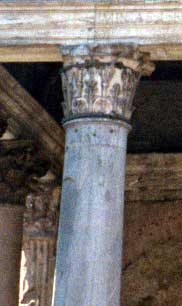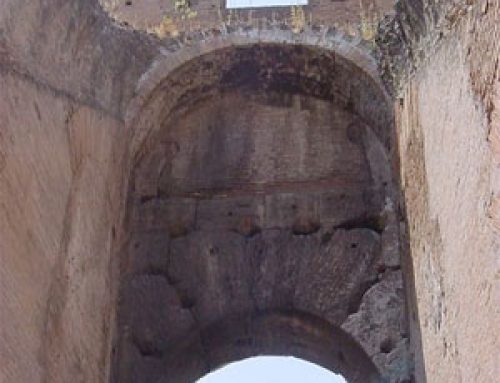
A Corinthian column capital (from the Pantheon in Rome)
A new type of architecture
By 400 BC, Greek architects had added a third type of column to the old Doric and Ionic styles. People called the new style the Corinthian column, after the city of Corinth.
Doric architecture
Ionic architecture
The city of Corinth
Greek temples
Greek architecture
All our ancient Greece articles
Who used Corinthian columns?
The Greeks never actually used the Corinthian column that much, even in Corinth. But the Romans, who liked fancier buildings, used it a lot.
Roman architecture
All our ancient Rome articles
What are Corinthian temples like?
The Corinthian style is fancier and heavier than the Ionic style. In Corinthian temples, the columns have a fancier base to stand on. At the top of the columns, on the capital, there’s a stone carving of acanthus leaves, under the architrave (ARR-kuh-trayv).
What is a frieze?
What are triglyphs and metopes?
On the architrave, as in Ionic temples, there is a continuous frieze where the triglyphs and metopes would be on a Doric temple.

Roman temple in the Corinthian style, at Nimes in southern France.
Examples of Corinthian architecture
One example of a Corinthian temple is the Pantheon. Another is the Temple of Castor in the Roman forum, and a third is this temple at Nimes, across the Alps in France.
The Pantheon in Rome
The Temple of Castor
Learn by doing: walk around town and look for different kinds of column capitals
More about Doric Architecture
More about Ionic Architecture
Bibliography and further reading about Greek architectural orders:
Ancient Greek Architects at Work, by J. J. Coulton (1982). An interesting look at how Greek architects worked.
Greek Architecture, by A. W. Lawrence, R. A. Tomlinson (5th edition 1996). Might be a bit out of date.
More about Ionic capitals
Or about Doric capitals
More about the Pantheon
More Greek Architecture
Quatr.us home




